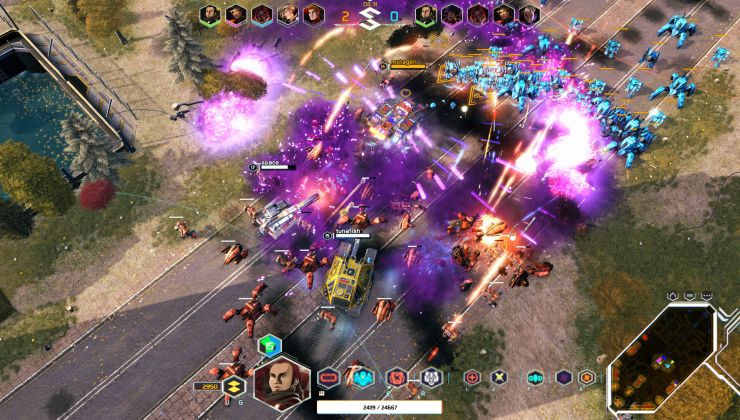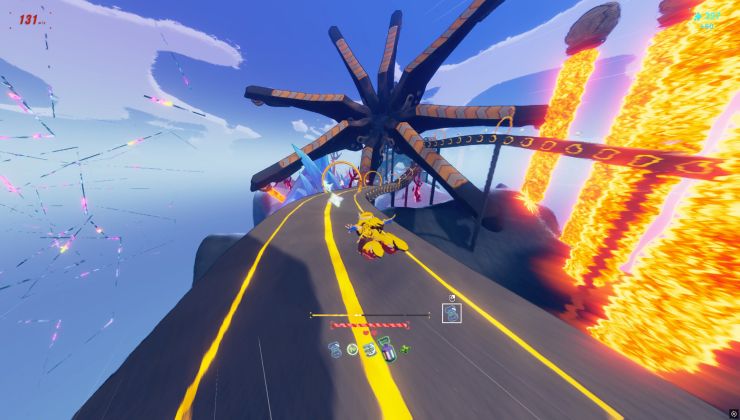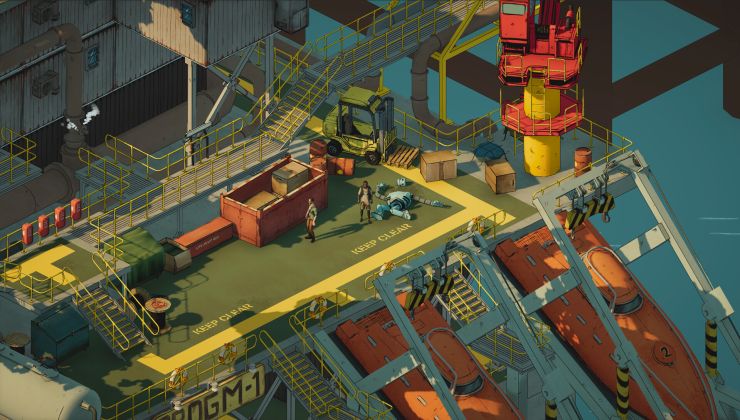Here we go again, yet another lawsuit has been filed against Steam developer Valve Software over an alleged abuse of their market position with their 30% cut. This time around it's a noted developer, Wolfire Games (Overgrowth, Receiver), along with two individuals William Herbert and Daniel Escobar "on behalf of all others similarly situated".
According to the documents, the argument is similar to one we've heard before. They're claiming that of the huge market that PC gaming is, "75% flow through the online storefront of a single company, Valve" and that "Valve uses that dominance to take an extraordinarily high cut from nearly every sale that passes through its store—30%" which results in "higher prices and less innovation" and that Valve can do this because of their market position so developers "have no choice but to sell most of their games through the Steam Store, where they are subject to Valve’s 30% toll".
One of the cited people is former Valve developer Richard Geldreich, who famously tweeted:
Steam was killing PC gaming. It was a 30% tax on an entire industry. It was unsustainable. You have no idea how profitable Steam was for Valve. It was a virtual printing press. It distorted the entire company. Epic is fixing this for all gamers.
The suit also mentions clauses Valve have that prevent developers selling at cheaper prices on other stores, "Valve blocks pro-competitive price competition through two main provisions—the Steam Key Price Parity Provision and the Price Veto Provision".
It goes even further to mention the likes of Microsoft, EA and more companies that tried and "failed to develop a robust commercial strategy away from the Steam Gaming Platform" arguing that it shows how vital Steam is and so the behaviour is anticompetitive. On top of that it even pulls in the Steam Workshop and the Steam Market, to claim this keeps developers even more tied to Valve and Steam and that Valve takes a big cut.
What are they hoping to achieve with this lawsuit? On top of damages and the usual, they want "injunctive relief removing Valve’s anticompetitive provisions" to "bring competition to the market and benefit the public as a whole".
What happened after? You mean the Covid-19 pandemic? Lots of things happened after, are any of them relevant?Rosen and Graham have been CEO and COO of Humble Bundle up until 2019, and are still in the company today as "advisors" after stepping down. [Source](https://www.gamesindustry.biz/articles/2019-03-29-humble-bundle-exclusive)I feel now that my money should rather go to Valve than to them for sure.They haven't been a part of Humble Bundle for years.
I think the confusion is that Wolfire sold Humble Bundle to IGN in 2017, even though the CEO's of Wolfire stayed on the Humble board as advisors, while also being CEO of Wolfire. A bizarre arrangement.
These aren't popular games, but they're solid games that used to get exposure. Now they don't. So the 30% cut by Valve, for these devs, is particularly insulting, because Valve is adding precisely no value. Indeed, many of these indies saw (for the first time, ever, over years) greater sales via Itch, than on Steam.The algorithm is a real problem indeed, but it doesn't mean the cut is unfair. People these days want to get everything for free and they realise later on why it was so cheap. Steam does take 30% but they inject it back in functionality, infrastructure and (sometimes open source) development.
Epic spend most of their money into buying exclusives, which are AAA games. In the end both consumers and indie developers get screwed but no one seems to care.
I'm tired of arguing this on behalf of the various indies I follow on Twitter, but I'll say it one more time - these Indies used to (past tense) get great value from Valve, by way of large customer base and a tiny bit of exposure to engage that customer base. As of the 2018 change, that is no longer the case.
There's simply no point in justifying a 30% cut by promoting services that will never be used... because no-one knows these games exist, since the algorithm doesn't give any exposure. It used to be a tiny sliver. Now it's not even that.
Personally, I suspect that Valve realised that a non-curated store was a terrible mistake - it led to uninteresting, fringe and plain "bad" titles being surfaced on its front page. Therefore this is simply a way to push those titles to the bottom of pile without actually taking the bad press that shutting them out would generate.
Just a shame it pole-axed the indies at the same time.
Andyou still speak in past terms, still referencing the 2018 stuff.
And now you talk abot the non-curated store that led to "uninteresting, fringe and plain "bad" titles being surfaced on its front page" - what? How many of those unsatisfied devs are actually the ones that people complain about?
What's your point. What are you asking me? I'll do my best to answer on behalf of the devs I'm now apparently defending.
You continue bringing up the 2018 incident and not what happened after. That seems disingenous.
Some "things that happened after" may even have been changes to the Steam store, but all in a sort of edge-tinkering sort of way as far as I can tell. I haven't seen any plausible argument or evidence that they would have nearly as big an impact as many people's documented experience of the algorithm change's impact.
The fact alone that they state the (free!) key provisions as a tool to suppress cheaper stores is laughable.
I really hope this will be rejected by court...
I'm making this argument (on behalf of the Indies I follow) on multiple threads, so I might have lost track of who I was quoting. Sorry. But in any case, my point is that a 30% cut is only justified if Valve add value. They used to, but with the algo changes, they now see no value at all. Honestly, I'm losing track of the various attacks on this position, so genuinely, apologies if I've misread what you're saying.No harm taken. We can all see why this issue is sensible for Linux gamers, torn between their inclination towards indie devs and the massive impact Steam has had on Linux gaming. And I don't have a clear answer either, it's just that we must keep in mind that there is more than meets the eye.
You continue bringing up the 2018 incident and not what happened after. That seems disingenous.What happened after? You mean the Covid-19 pandemic? Lots of things happened after, are any of them relevant?
Some "things that happened after" may even have been changes to the Steam store, but all in a sort of edge-tinkering sort of way as far as I can tell. I haven't seen any plausible argument or evidence that they would have nearly as big an impact as many people's documented experience of the algorithm change's impact.
He brings up the 2018 incident again and again, where some devs complained about the algorithm. I can't make a judgment how justified this was.
https://www.gamesindustry.biz/articles/2018-12-05-valve-offers-explanation-for-october-drop-in-steam-traffic
In 2019 they made big changes again...
Valve also points out that it got feedback that the old algorithms felt too biased towards the store's most popular games, and really didn't feel very personalized as a result.
https://comicbook.com/gaming/news/steam-store-discover-update-features/
He doesn't bring that up and behaves like the 2018 thing is still the status quo. Why?
They made further changes down the line
https://store.steampowered.com/news/app/593110/view/1714119088658959583
And they just released the latest store change a few weeks ago.
The real issue is Valve/Steams market share putting them in a position of great power. If only more people used GOG.
I would support Epic a little more if they released a Linux EGS client and had a Linux supported platform, but they don't. Also being tied to Tencent is no doubt going to become a problem down the line.
GOG dont heve linux build of their own Galaxy!
GOG support Linux packaging system, and categories. Its only their Galaxy Client that's not supported yet, but open-source has helped that along a little bit.
Last edited by TheRiddick on 1 May 2021 at 8:55 am UTC
Yeah %30 is pretty high for a DIGITAL GOODs based store. Who knows if Valve will change this policy. It does hurt indie devs the most who can't achieve high sales numbers to get discounted 'valve tax rate'.
Why is it always "this is against Indies"? Valheim is a small indie title and sold bonkers numbers. Avengers is a AAA blockbuster with a HUGE name behind it (the biggest running movie franchise!) and it bombed hard.
Valve wants to sell games. Why should they make a difference between AAA and Indie? Money is money.
Interestingly are all those successful indie titles not only successful but also f*cking good. Hundreds of them: Dead Cells, Everspace, Limbo, Factorio, Mindustry, Opus Magnum, Stardew Valley, Terraria, Among Us...
One could say: That's the reason. And not because they got a popular spot on the carousel.
Ah! That's the reason ! That's why these devs, who got thousand plus sales before the algorithm change, suddenly experience less than a hundred sales afterwards? Good to know. Quality of games. Quality... that... suddenly, within weeks... deteriorated exponentially...?
Okay.
Yes, I am still convinced that that is the reason (plus something like "serving a popular genre" and it doesn't imply that every "good" game will be successful). Can you back up your claims (or rather the indie developers you follow on Twitter) with some hard data? Or at least name some of those titles? How can this ominous "algorithm change" explain that certain indie developers are still going strong (Mimimi Games or Motion Twin)?
This feels more like these statements that the Linux market share is "skewed" because the the survey "doesn't show up", "shows up on Windows more often", "shows up only after re-installs (which happen on Windows often, on Linux never)", etc.
Second edit:
To clarify I am aware of the buzz the algorithm change caused in 2018(?) which was allegedly fixed soon after that.
Last edited by Tuxee on 1 May 2021 at 9:30 am UTC
GOG dont heve linux build of their own Galaxy!
Arten wrote that, not me.
GOG dont heve linux build of their own Galaxy!
GOG support Linux packaging system, and categories. Its only their Galaxy Client that's not supported yet, but open-source has helped that along a little bit.
Client is part of bare minimum. If you developing game with use of GOG Galaxy API for somethink, you are discouraged from release linux build because you can release only crippled version of game.
To be honest, i buy on gog some realy old games which i played as young. But for something newer i want atleast client. But preferably also proton integration. Valve has done most of the work for them and may as well start contributing to it themselves.
There is one more think. 30% is a misleading. Valve has their cut only if they sell it. But if developer generate key and sell it elsewhere (humble bundle,...) key is free, game has full support of steam store but valve has 0 money from it. So in 30% is also calculated usage of infrastructure for "black passenger" whom did not payed it. Devs did note use this? How it is Valve fault? Devs have this option!
https://arstechnica.com/gaming/2019/04/why-valve-actually-gets-less-than-30-percent-of-steam-game-sales/
I think that's really interesting. Thank you for sharing. I did not know that. Great engagement tool. I assume the idea is to re-capture the consumer once they get back to Steam for the next and subsequent purchases?
I assume it's a great lock-in tool on the sales side too since a key seller doesn't need thier own infastructure, there's no point in investing in a full store/client/distribution system. Hence no full on competition to Steam since they need Steam for thier store?
Edit. Sorry for the double post. Im honestly not sure what I did.
Probably. Or they just want expand comunity. Or Gaben see it as moral thing to do, Valve is not public traded company, so they can do what they want, even if that is clear loss for them, because the did not have shareholders from whole world who want only money (I don't think it is this case, but it is possibility)
Last edited by Arten on 1 May 2021 at 10:05 am UTC
GOG dont heve linux build of their own Galaxy!
GOG support Linux packaging system, and categories. Its only their Galaxy Client that's not supported yet, but open-source has helped that along a little bit.
Client is part of bare minimum. If you developing game with use of GOG Galaxy API for somethink, you are discouraged from release linux build because you can release only crippled version of game.
To be honest, i buy on gog some realy old games which i played as young. But for something newer i want atleast client. But preferably also proton integration. Valve has done most of the work for them and may as well start contributing to it themselves.
This has gone off topic in the end, but part of GOG is that games are DRM free, and that they're standalone. They're not supposed to require the client, making the client optional, and not bare minimum on GOG. Though of course you might want it, which is obviously personal preference for an individual.
Game is not requere galaxy for running, but it can use galaxy client for matchmaking. Multiplayer game without matchmaking is crippled even if you can run it without client and you can play it in LAN mode...
The 30% may seem high, but it's a pretty standard retail markup. In a lot of cases as with physical goods, markups* are even higher. Anyway, I predict that Valve will actually drop to 12% in line with some other stores eventually.Good point! Because of my experiences, Valve has always seemed to me to be more of a gallery than a straightforward retail outlet, but in either situation the price typically goes up 50% or more above wholesale.
* Although I guess technically not a markup since the starting point is the retail price, not the wholesale price.
An artist selling in a gallery typically nets only 50% of the selling price of a painting or other work of art. Thus the rule of thumb I learned was to add up time, all materials, transportation costs, etc., and double the sum to get your asking price. The gallery was never seen as "taking 50% from" the artist, but as having more of a partnership role, a contracted sales force for the artist.
Furthermore, for reasons that should be pretty obvious, if you're selling through galleries, selling your art cheaper outside those galleries system is systemically, if not contractually, verboten.
Ok Sweeny, come out, come out wherever you are ...
Last edited by Nanobang on 1 May 2021 at 11:56 am UTC
There is one more think. 30% is a misleading. Valve has their cut only if they sell it. But if developer generate key and sell it elsewhere (humble bundle,...) key is free, game has full support of steam store but valve has 0 money from it. So in 30% is also calculated usage of infrastructure for "black passenger" whom did not payed it. Devs did note use this? How it is Valve fault? Devs have this option!
https://arstechnica.com/gaming/2019/04/why-valve-actually-gets-less-than-30-percent-of-steam-game-sales/
I think that's really interesting. Thank you for sharing. I did not know that. Great engagement tool. I assume the idea is to re-capture the consumer once they get back to Steam for the next and subsequent purchases?
I assume it's a great lock-in tool on the sales side too since a key seller doesn't need thier own infastructure, there's no point in investing in a full store/client/distribution system. Hence no full on competition to Steam since they need Steam for thier store?
Edit. Sorry for the double post. Im honestly not sure what I did.
Probably. Or they just want expand comunity. Or Gaben see it as moral thing to do, Valve is not public traded company, so they can do what they want, even if that is clear loss for them, because the did not have shareholders from whole world who want only money (I don't think it is this case, but it is possibility)
That a good point, and a possibility. I'll admit I'm skeptical of that though. Customer Engagement through freebies is pretty common in a variety of tech industries (and others). In this particular arrangement, all roads lead to Steam and it's cheaper to keep a customer than attract a new one. It's likely considered an expenditure, not a loss, to get customers (new and repeat) to come to the store since the idea of to get a net gain with subsequent purchases.
I finally thought of a comparable example overnight. GOG's Connect. Where they'd give you the game if you had the Steam version. Same idea. Take a "loss", to get customers in the store. Again, once you get them engaged as a customer it's cheaper to keep them and is paid for by later purchases.
This has gone off topic in the end, but part of GOG is that games are DRM free, and that they're standalone. They're not supposed to require the client, making the client optional, and not bare minimum on GOG. Though of course you might want it, which is obviously personal preference for an individual.
It's about having similar features as well. And this is import for our OS, as if you want let your OS be more popular you need to have the same features for whoever want to switch. You can see a similar logic from some GOG users that created a black list of devs when they do not get the same features on GOG as in Steam for a game.
I find it hilarious people are comparing digital copies of games to physical goods in the retail markets like its Apples to Apples comparison. Its just not, too many people clueless about software development and cost/time associated.
To be fair, you can get the same conclusion when you see people saying "30% is way too much" when we don't have access to the operating costs of Steam.
Last edited by x_wing on 1 May 2021 at 2:55 pm UTC
Again, Valve simply says upfront that if you want to use their platform to sell your product, then you agree not to then take your product to a competitor and undercut Valve. In other words, Valve doesn't want a developer using them as a promotional tool to gain exposure and then the developer driving business to a competitor by offering the competitor a lower price, and that's perfectly reasonable. If a developer doesn't like those terms then they are free to sell elsewhere.Of course this lawsuit is meritless like similar lawsuits before it. If a developer doesn't like Valve taking a 30% cut and not allowing the developer to undercut Valve on another platform, then they are free to sell through another store. If an indie developer wants better sales then they need to take it on themselves to do some marketing rather than thinking all they have to do is dump their game on Steam.
That's not the whole story of the lawsuit though. It's not just about a 30% cut, it's also about if you want to sell on Steam and another store, then Valve are (allegedly) forcing certain conditions related to using the other store. That puts a different perspective on the matter - it is (allegedly) using the market share of Steam to keep other stores from offering better prices.
I need to read more on it to form my own opinion on right or wrong, but the lawsuit is about it not being a simple matter of being free to sell through another store.
Now if a competitor wants to sell at a lower price -- in other words, dip into their own profit margin -- then that's their business, and Valve can't do a damn thing about it. But the developer can't initiate it per his agreement with Valve.
That's where it gets a little murky. The last part, selling elsewhere at a lower price, is what the wording in sections 147 and 148 of the lawsuit appear to deal with. That's what I want more time to read about, and the part which might actually have merit in my view.
147 seams to be that Valve requires publishers to have the same discount on Steam if the game is sold with a long term discount on another store:
we’d just choose to stop selling a game if it was always running discounts of 75% off on one store but 50% off on ours. . .
And 148+ seams to be Wolfire arguing a possible slippery slope based on that.
wow everyone here is an expert at games development and marketing!1!So if I'm decoding the sarcasm correctly, what you're saying is we should all shut up because we're not technocrats. Our overlords the corporate executives know what's best for us, after all.
wow everyone here is an expert at games development and marketing!1!So if I'm decoding the sarcasm correctly, what you're saying is we should all shut up because we're not technocrats. Our overlords the corporate executives know what's best for us, after all.
No answer?
Wut?wow everyone here is an expert at games development and marketing!1!So if I'm decoding the sarcasm correctly, what you're saying is we should all shut up because we're not technocrats. Our overlords the corporate executives know what's best for us, after all.
No answer?
Wut?wow everyone here is an expert at games development and marketing!1!So if I'm decoding the sarcasm correctly, what you're saying is we should all shut up because we're not technocrats. Our overlords the corporate executives know what's best for us, after all.
No answer?
https://www.gamingonlinux.com/2021/04/wolfire-games-filed-a-lawsuit-against-valve-over-abuse-of-their-market-position/comment_id=202635
You asked me. I answered and explained what happened after 2018.











 How to set, change and reset your SteamOS / Steam Deck desktop sudo password
How to set, change and reset your SteamOS / Steam Deck desktop sudo password How to set up Decky Loader on Steam Deck / SteamOS for easy plugins
How to set up Decky Loader on Steam Deck / SteamOS for easy plugins
See more from me